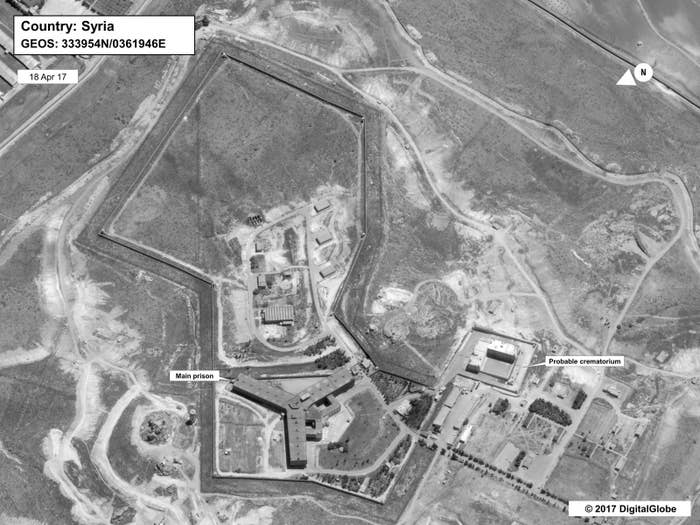
The US on Monday accused the Syrian government of constructing a crematorium at a notorious prison to incinerate evidence of the mass killing of detainees inside the facility.
"Although the regime's many atrocities are well documented, we believe that the building of a crematorium is an effort to cover up the extent of mass murders taking place in Saydnaya prison," acting assistant Secretary of State for Near Eastern Affairs Stuart Jones told reporters on Monday in an on-camera, on-the-record briefing at the State Department, a relatively rare occurrence under the Trump administration.
The State Department's determination was provided alongside a set of newly declassified photos of the Saydnaya facility, which is a 45-minute drive from the capital city of Damascus. Jones called the facility the largest and most secure of Syria's many prisons, which according to non-governmental organizations have housed between 65,000 - 117,000 people the government detained between 2011-2015.
(More recent figures have been hard to come by, as the Syrian civil war — which first began as a series of protests against President Bashar al-Assad — has been upended first by the rise of ISIS, then by the intervention of Russia on the behalf of the Assad government.)
Jones described a place where 70 detainees are reportedly held inside cells designed for five people. As many as 50 detainees per day are killed at the center, Jones said, citing "multiple sources," with many disposed of in mass graves. The State Department now believes that the alleged crematorium, a building that was modified beginning in 2013, is working overtime to dispose of the bodies.
Asked what convinced the US that the building in question was a crematorium, Jones pointed to the satellite photos distributed prior to the briefing, specifically noting the changes between 2013 and 2016. The photos are labeled to show where HVAC equipment and a "possible firewall" has been installed.
Jones also cited snow melt on the roof of the building in one picture as evidence of its purpose.
Amnesty International issued a harrowing report in February attempting to document alleged mass hangings and other extrajudicial executions at Saydnaya. An Amnesty spokeswoman said the organization could not verify the State Department’s allegations, but said the alleged mass incineration of prisoners’ bodies matched the depravity and impunity found in their own research.
“This is in line with the findings that we highlighted in our report back in February,” spokeswoman Sara Hashah said.
The controversial US allegations recall some of the worst crimes against humanity of the 20th century, including under Nazi Germany and the Khmer Rouge in Cambodia.
“It makes it even more crucial that Russia and US pressure the Syria government to allow access to prisons all across Syria including Sayndaya,” she said. “There are no monitors that have access to prisons anywhere in Syria. Their presence could deter future violations.”
Assad himself denied Amnesty’s accusations in February, but also said he’d never been to Saydnaya himself. Supporters of the regime have decried such allegations as attempts by world powers to demonize the Syrian regime.
Hashash suggested an easy solution to quell the doubts of skeptics.
“If it’s not true, the onus is on the Syrian government to allow those monitors to show what is really going on,” she said.
Jones dispelled the notion that Russia or Iran are participating in the events at the prison, but suggested that they could still be held responsible, citing Russia's status as a "guarantor" of the Syrian government under peace talks taking place in Kazakhstan.
"The regime must stop all attacks on civilians and opposition groups, and Russia must be held responsible to ensure regime compliance," he said.
But it remains unclear exactly how Monday's revelation will change US policy toward Syria, if at all. Asked about airstrikes of the sort launched after Assad's government launched a chemical attack in February, Jones demurred.
"We're not going to signal what we're going to do or not going to do," Jones said, paraphrasing President Trump's frequent dismissal of requests for details about possible military action.

